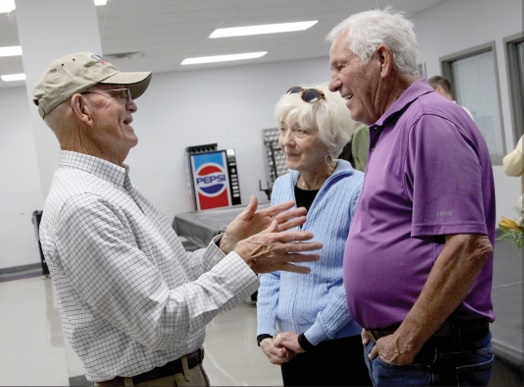Denali settles with feds for alleged EPA Clean Water violations in AZ, CA
According to a Nov. 12 news release from the U.S. Environmental Protection Agency (EPA), Denali Water Solutions LLC of Russellville, Ark., has agreed to pay a $610,000 civil penalty as part of a settlement with the federal government for violations of the Clean Water Act (CWA) in Arizona and California.
The EPA news release said since at least 2016, Denali repeatedly land-applied sewage sludge to farm fields in Arizona and southern California at levels that exceeded the nitrogen needs of the crops in those fields and repeatedly failed to obtain the information necessary to determine the correct amount of sewage sludge to apply.
“Such alleged violations can lead to nitrogen and other pollutants migrating to groundwater or running off into nearby surface waters,” the EPA said.
According to the EPA, excess nitrogen in drinking water can be harmful to infants or young livestock. In surface waters, too much nitrogen can lead to overgrowth of aquatic plants, increased harmful algal blooms, decreased light penetration, and reduced levels of dissolved oxygen. Each of these conditions makes it difficult for fish to live and people to swim, the EPA said.
Denali provided the following statement regarding the judgment:
“While Denali has reached a settlement with the U.S. EPA regarding biosolids land application in Arizona and California, we deny the agency’s allegation from more than six years ago that we violated any laws or policies regarding biosolid land application.
Organics recycling plays a critically important role in sustainability by repurposing organics into useful products instead of filling landfills where they can emit dangerous greenhouse gases. The collection and processing of biosolids is vital to American farmers as it serves as a natural fertilizer, putting natural nutrients back into soil, which assists in yielding more robust crops with organic soil amendments. This service also is vital to the successful operation of municipal wastewater treatment facilities.”
According to the EPA, Denali provides land application services of sewage sludge derived from wastewater treatment facilities. The sludge is also known as “biosolids.”
Biosolids are regulated by the EPA under the federal Clean Water Act. Pursuant to the regulations, biosolids producers and land appliers are required to collect pollution data on biosolids before applying it to land, and land appliers are required to apply biosolids at a rate that limits the amount of nitrogen to what the crop or vegetation can utilize.
“EPA’s biosolids regulations protect wetlands, streams, rivers, and groundwater from harmful sewage sludge pollution,” said Meg McCollister, EPA Region 7 administrator.
EPA’s Region 7, which includes Missouri, Iowa, Kansas, Nebraska and nine tribal nations, is the lead region where biosolid violations of the Clean Water Act occur, according to the EPA.
In Missouri, after multiple violations of the Missouri Clean Water Law while land-applying meat and other food-processing waste in Newton and McDonald Counties, Denali signed an Abatement Order of Consent (AOC) issued by the Missouri Department of Natural Resources (DNR) in August 2023. The terms of the AOC stipulated that the company cease its land-application in Missouri and empty its Evans and Gideon storage lagoons in Newton and McDonald Counties.
According to an August 2024 announcement on Synagro Central’s website, Denali and Synagro have closed on a “mutually beneficial assets agreement.” Synagro will acquire Denali’s municipal biosolid service business in California, the announcement said, while Denali will take over Synagro’s “industrial non-biosolid organic assets” (meat-processing sludge) in Arkansas and Missouri.
“Prior to reaching the settlement agreement, we made the business decision to sell our biosolids operations in those states to prioritize our other organics activities there, such as collecting and recycling food waste and used cooking oil,” the Denali statement said. “Denali remains committed to our municipal services in other markets.”
If a Missouri farmer and two Missouri environmental groups have their way, however, Denali’s (and other businesses’) plans for the land application of meat-processing and biosolid sludge in Missouri could be thwarted.
In October, Craig Family Farms, LLC, Stop Land Use Damaging our Ground and Environment (S.L.U.D.G.E.), LLC, and Citizens of Randolph County Against Pollution (CRAP), LLC, served formal notice of their intent to file a lawsuit in federal court to stop the land-application of meat and food-processing waste and biosolids to Missouri farmland.
Organizations served include the Missouri Department of Natural Resources (DNR), Denali; Synagro; Bub’s, Inc.; HydroAg Environmental, LLC; and Reed Environmental, LLC.
“The DNR has until Dec. 12, 2024, to stop all future land application of toxic industrial sludges throughout Missouri,” said Attorney Ryan Mohr, with Fox Smith, LLP, who is representing the environmental groups, along with Stephen Jeffery, of Jeffery Law Group, LLC.
If the DNR fails to prohibit such land application, a lawsuit will be filed in federal court seeking a permanent injunction to stop the land-application, Mohr said.
According to the EPA’s news release pertaining to Denali’s violations of the Clean Water Act in Arizona and California, Denali ceased land application activities in those states in mid-2024.
Whether Synagro’s planned takeover of Denali’s previous biosolid activities in California is a result of Denali’s Clean Water violations in that state isn’t clear.
The EPA said, according to the terms of Denali’s settlement, the company will be required to follow a specific “Soil Sampling and Agronomic Rate Calculation Protocol” if Denali resumes land application in the region.
The EPA estimates that by ceasing land application and complying with the settlement terms, the excess application of 5.8 million pounds of sewage sludge will be eliminated annually.
The proposed EPA consent decree was filed in the U.S. District Court for the District of Arizona. The consent decree is subject to a 30-day comment period. Information on how to provide comments and a copy of the proposed consent decree are available on the Justice Department’s Proposed Consent Decree webpage at https:// tinyurl.com/23cwuaty.
More information on this enforcement action is available at https://tinyurl.com/2vm6bxtn.




